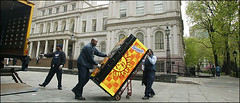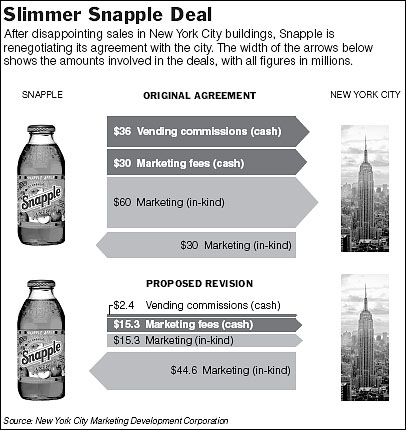Snapple deal not as refreshing as expected
 Ruby Washington/The New York Times. A Snapple vending machine was delivered to City Hall in 2004. But only about 700 of 3,500 machines that were supposed to be placed in city buildings have been installed.
Ruby Washington/The New York Times. A Snapple vending machine was delivered to City Hall in 2004. But only about 700 of 3,500 machines that were supposed to be placed in city buildings have been installed.The New York Times reports, in "For the City, Selling Snapple Becomes a Glass Half Empty," and in a follow up news analysis, "Why Snapple Deal Shrank" about the famed exclusive marketing deal that New York City set up with Snapple Beverages to make Snapple the "official" city drink. (Also see this 2004 article, "Snapple in the Apple: Gulp! How Mayor Bloomberg's business pros dribbled their marketing mission" from the Village Voice.) From "For the City":
The Bloomberg administration acknowledged yesterday that its innovative agreement to let Snapple sell beverages in city-owned buildings in exchange for cash and tourism promotion had fallen far short of its goals, with the company failing badly to meet its sales targets since the deal began nearly two years ago.
The failure to sell the drinks will leave the city some $93 million short of the cash and marketing benefits it hoped to receive from the deal, officials said yesterday. To try to increase sales, the city agreed yesterday to renegotiate the complex arrangement so that it will spend more to promote its partnership with Snapple through concerts, bus-shelter advertisements and other steps, while the company accepts far lower sales goals.
The development set off a new round of criticism of a deal that had already drawn widespread condemnation on several fronts: for the fact that the original agreement was reached without competitive bidding, and for the city's promotion of calorie-packed products.
Under the original agreement, which Mayor Michael R. Bloomberg had promoted as a novel way to bring in revenue, one million cases of Snapple drinks were supposed to be sold each year. Instead, only 50,000 were sold in the first year of the deal and another 70,000 are projected to be sold by the end of the second year, in April.
As a result of the lackluster sales, the city government will likely derive only $33 million ($17.7 million in cash and $15.3 million worth of marketing benefits) compared with the $126 million ($66 million in cash and $60 million worth of marketing) that was projected when the deal was announced in September 2003. The city's Department of Education has a separate $40 million arrangement with Snapple to sell fruit-juice drinks and water in the 1,200 city schools; education officials said yesterday that that arrangement is close to meeting its financial goals.
According to the news analysis, "Why Snapple Deal Shrank,":
The deal has cast a spotlight on the city's Marketing Development Corporation, the nonprofit group that the city founded in July 2003 to identify branding opportunities to raise money for the city....
Joseph M. Perello, whom the mayor hired in April 2003 to be the city's first chief marketing officer, said he did not regret the deal's lofty goals. "We were too ambitious," he said. "That's basically it. We were definitely too ambitious. But I will say I'm happy to be guilty of being too ambitious."
Mr. Perello oversees a staff of 23 at the marketing agency, including a lawyer and a paralegal who jealously guard the city's trademarks and pursue companies that make or sell knockoff products that infringe on the city's intellectual property.
Mr. Perello, 37, said he would prefer to focus on the corporation's successes, like bringing the Country Music Association's annual award ceremony to New York City for the first time, on Nov. 15, and being the host of the world premiere of Peter Jackson's remake of "King Kong" in Times Square, on Dec. 5.
"I'm not sorry about all of this," he said of the beverage deal. "I would do it again. Obviously, if I had the chance I'd want to learn and do it better. But if you want to innovate and do new things, you have to be willing to reach and take risks."

If these numbers are to be believed, then New York City will give more to Snapple in terms of in-kind advertising (ads on bus shelters, etc.) then it will receive back from Snapple in cold, hard cash? (Sounds more like one of those timber deals in U.S. forest lands, where the cost of building roads for loggers far exceeds any revenue generated by the deals.)
Index Keywords: city-marketing



0 Comments:
Post a Comment
<< Home